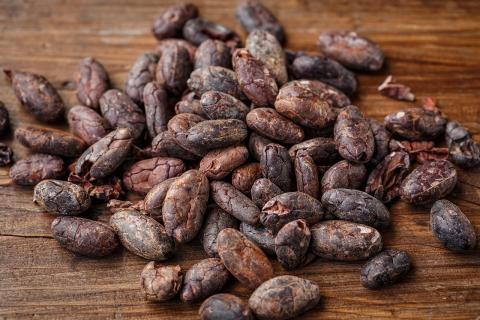
Unless you’ve been living under a rock for the past decade, you’ve probably heard that the future of nutrition is living, raw, plant-based foods. Especially if you’re an athlete, certain superfoods are best equipped to feed the complex layers of your biological makeup, not just your wayward taste buds—whether you’re training for your first half-marathon or your sixth Iron Man. Whether you swim, bike, ski or play on a competitive sports team, superfoods make all the difference when it comes to conditioning your body and mind. Crucial everyday fruits, vegetables, nuts, seeds, sprouts, grasses, and fresh herbs that grow under our sun contain life-altering minerals, anti-aging antioxidants and immune-stimulating enzymes that will keep you energized and revitalized. However, these four superfoods contain unique properties to promote your wellness from within, encouraging your ability to self-heal so that you can perform with long-lasting strength and endurance.
1. Cacao Beans
As the purest form of chocolate, cacao may not taste as divine as its processed cousin but it is loaded with a higher concentration of antioxidants than any other food in the world. Raw cacao is the dried and fully fermented seed of the Theobroma cacao tree that flowers year-round and has been native to Central American cultures for over 5,000 years. With a high dose of antioxidants called flavonoids, eating raw cacao regularly may protect you against cardiovascular disease while reducing your risk of a stroke and greatly improving your blood circulation. According to The American Journal of Clinical Nutrition, cacao not helps to thin your blood, it can also prevent blood clots, proving that eating raw cacao may be more effective than taking an aspirin once a day. These days you can buy cacao nibs at a variety of everyday stores and retailers for a convenient, bite-sized version of this healthy snack.
2. Chia Seeds
For a quality recovery after a hard workout, athletes swear by eating chia seeds for a complete source of protein as they contain 8 essential amino acids your body needs to repair your overworked muscles. Since chia seeds are highly absorbent, they become a gelatin-like substance in your stomach that slows your digestive processes due to its extremely high fiber content. Incidentally, this absorbency aids your body to regulate your fluid retention and balance your hydration. Top-selling book Born to Run contextualizes the history of people’s relationship with chia seeds via a Native American tribe in Mexico, the Tarahumaras, who were renowned for their long-distance running abilities of up to 400 plus miles. As a dietary aid, the Tarahumara consumed chia seeds regularly to replenish their bodies. According to the Journal of Biomedicine and Biotechnology, chia seeds are a powerhouse for human nutrition, full of healthy omega-3 fatty acids. Today, chia seeds have become popularized by modern day ultra-marathon runners looking to increase their stamina and endurance. As part of a balanced breakfast, many athletes prefer to add chia seeds to their yogurt for a chewy protein texture that is sure to boost energy levels and make them feel full longer. You can also make chia pudding for a healthy dessert.
3. Goji Berries
Touted as one of the most nutritionally-rich berries on the planet, goji berries are a unique superfood that’s proven to balance our blood sugar levels, improve our overall cardiovascular system and digestive system, and help our liver to detoxify and protect itself from external damage like carcinogens. According to superfood expert David Wolfe, goji berries also have the ability to combat something called “oxidized cholesterol,” which leads to heart disease. Goji berries protect our built-in defense system, an enzyme called superoxide dismutase (SOD), against oxidized cholesterol that can result in plaque and blood fats attaching to our artery walls by increasing our production of the enzyme. With life-affirming active phytonutrients like betaine, polysaccharides and antioxidant pigments, goji berries contain anti-inflammatory properties that produce a calming effect on your digestive system and contain healthy fatty acids that stimulate collagen production for healthy skin as well as moisture retention for longer periods of hydration. As a part of a healthy diet, athletes eat goji berries for their adaptogenic characteristics to alleviate physical stress and drastically improve their immune system. Often soaked and rehydrated in water, goji berries make for a very hydrating beverage, soup base, or smoothie ingredient. (Get double the health benefits with this chia seed and goji berry pudding!)
4. Spirulina
The blue-green algae known as spirulina may be found on the alkaline waters of Mexico, Asia, Central Africa, and the Americas. Its color is due to its beneficial plant pigments like chlorophyll that, according to Lauri Boon’s book, Powerful Plant-Based Superfoods: The Best Way to Eat for Maximum Health, bind to and kill any cancer-causing compounds. Packed with vitamins and minerals like selenium, magnesium, vitamin E, and iron alongside 9 essential amino acids and omega-6 fatty acids known to actively reduce inflammation, spirulina represents another key superfood for athletes looking to supercharge their immune system and repair their fatigued muscles and joints. With spirulina now available in most supermarkets and health food stores, athletes can take advantage of its health benefits in powder form, making it a seamless ingredient to add to fresh juices and smoothies. (Grow your own spirulina for a fun, healthy, sustainable project!)
Sources:
Boone, Lauri. Powerful Plant-based Superfoods: The Best Way to Eat for Maximum Health, Energy, and Weight Loss. Fair Winds Press (MA), 2013
Mohd Ali, Norlaily et al. “The Promising Future of Chia, Salvia Hispanica L.” Journal of Biomedicine and Biotechnology 2012 (2012): 171956. PMC. Web. 1 Sept. 2017.
Rein, Dietrich, et al. "Cocoa inhibits platelet activation and function." The American journal of clinical nutrition 72.1 (2000): 30-35.
Wolfe, David. Superfoods: the food and medicine of the future. North Atlantic Books, 2010.








